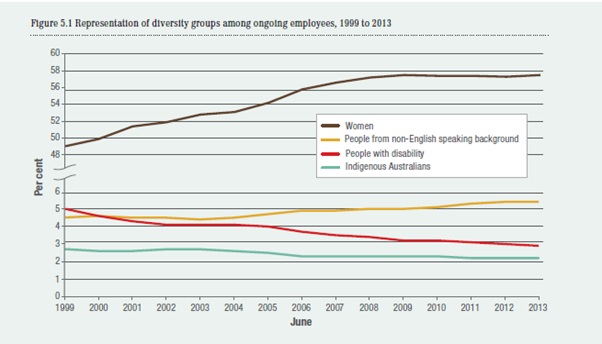Posted 28/02/2014 by Deirdre McKeown
On 26 February 2014, Greens member Adam Bandt introduced a private members’ bill to deal with ‘the high unemployment and underemployment rates amongst people from two very important groups in our society … people from non-English speaking backgrounds, and … Australians with a disability’. This fulfilled a 2013 election commitment by the Australian Greens that ‘workplaces should reflect the diversity of Australian society and that everyone should have equal access to meaningful paid employment’.
The Public Service Amendment (Employment for all of us) Bill 2014 ‘requires the Australian Public Service (APS) to double the number of employees from each group within five years’. The Bill leaves the means of achieving these targets to the Public Service Commissioner to determine but requires the Commissioner to issue a written direction to double the number of APS employees in these two groups that exist at 1 July 2014 by 1 July 2019. The Bill also amends section 7 of the Public Service Act 1999 to give the term disability the same meaning as set out in s. 4 of the Disability Discrimination Act 1992.
In his second reading speech Bandt noted that the APS employment principles in s. 10(A) of the Public Service Act include a commitment to a career-based public service that ‘recognises the diversity of the Australian community and fosters diversity in the workplace’. He suggested that the APS is lagging in this commitment:
‘We know that almost 20 per cent of Australians identify as having a disability, but the number of people with a disability employed by the APS dropped to 2.9 per cent of the entire workforce in 2012. Similarly, one in four people in Australia identify as being from a non-English speaking background but account for only 5.1 per cent of the APS workforce.’
He also observed that ‘we run a very real risk of creating an underclass of people who, as Australian citizens, are being systematically locked out of the workforce. It will not solve the problem, but it will be a significant step towards moving people who want employment into that gainful employment’.
The Australian Public Service Commissioner has issued Directions that include the issue of workplace diversity.
State of the Service Report 2012-13
The most recent State of the Service Report published by the Australian Public Service Commission (APSC) states that, according to Australian Bureau of Statistics figures, people with disability are underrepresented in the Australian workforce, despite 15% of the working age population reporting disability.
The proportion of people with disability in the APS in 2012–13 was 2.9% of all ongoing employees. This was unchanged from the previous year. In absolute terms, the number of ongoing employees with disability fell from 4,570 in 2011–12 to 4,450 in 2012–13, continuing a trend of steady decline since the mid-1990s.
The proportion of ongoing APS employees who identified as being from a non-English speaking background remained stable during 2012-13 at 5.4%. The State of the Service Report noted that ‘people from a non-English speaking background constituted 4.6% of all engagements to the APS in 2012–13. This represents a sharp decline in absolute numbers from 572 engagements in 2011–12, to 350 engagements in 2012–13’. It also concluded that APS employees from a non-English speaking background are much more likely to have graduate qualifications than other employees—at June 2013, 82.1% had a degree-level qualification, compared with the APS average of 59.5%.
The State of the Service Report 2012-13 shows the following trends in diversity from 1999

Source: Australian Public Service Commission, State of the Service Report 2012-13, Chapter 5: diversity, p. 97.
Note that the provision of diversity information on disability and non-English speaking background is voluntary. As a result the APSC has concluded that the number of employees with disability in the APS may be underrepresented.
The Bill was seconded by Independent Andrew Wilkie and debate was adjourned.